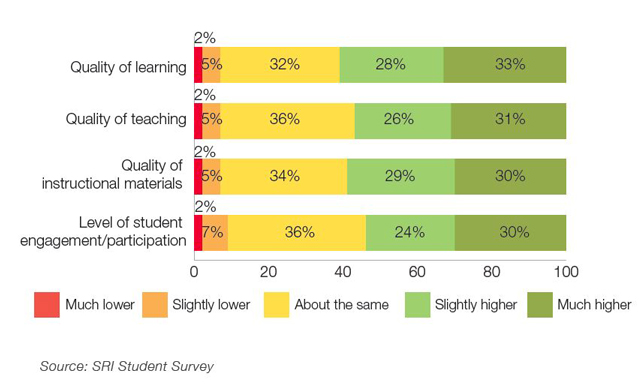Research
Report: Students Prefer Courses that Use Open Educational Resources
- By Dian Schaffhauser
- 10/12/18
Students like courses that use open education resources over their typical classes. In a recent research project, most (61 percent) reported that they experienced a boost in their learning experience; 59 percent said the quality of the instructional materials was better; 57 percent considered the caliber of teaching higher; and 54 percent claimed a stronger level of engagement. OER also made classes more affordable.
Those results come from a study examining the implementation of OER in colleges. The work was commissioned by Achieving the Dream, a national nonprofit that works with a network of community colleges to help students succeed. Achieving the Dream has been running an "OER Degree Initiative" in 38 colleges over the last couple of years, and this latest report was meant to capture a snapshot of findings to date. The research was undertaken by SRI Education, a division of research company SRI International, and education consultancy rpk Group. Data for the entire project came from 2,441 student surveys given across 12 sites, as well as site visits to 11 colleges, where numerous individuals were interviewed (including 51 administrators, 25 faculty members and 68 students) and classroom observations were performed.

The student OER course experience, compared to typical classes. Source: "Participant Experiences and Financial Impacts: Findings from Year 2 of Achieving the Dream's OER Degree Initiative."
The study found that students in OER courses saved between $66 and $121 per course, depending on what type of textbook purchase they formerly used. That amounted to $6.5 million in net savings, at minimum, over two years for students in participating schools.
The research also showed how students would use the savings accrued from not having to purchase study materials: to cover college tuition (50 percent), personal expenses (48 percent), learning materials for other courses (43 percent) and even to take additional classes (28 percent).
About half of Pell Grant recipients (48 percent) and more than half of underrepresented minorities (52 percent) in the study reported that the OER courses would help them afford college, compared to 41 percent of other students.
Oddly, six in 10 students didn't know they were signing up for OER courses to begin with; 19 percent only learned they were registered for an OER class when they took the survey. Another 24 percent figured out the OER connection because it was indicated when they registered as part of the course name or in a symbol next to it. As one student told interviewees, "When I was registering for classes, I purposely clicked on courses that had the OER symbol because I knew that would save me money."
Most of the OER content was accessed electronically. Just 13 percent of students reported choosing to purchase printed copies. And in 63 percent of cases, students said they printed out less than a quarter of the materials.
For the future, a majority of students (58 percent) suggested that they'd choose OER courses again or recommend them to friends. As one student put it, "If I could go back and do OER from the first semester, I definitely would."
"The study indicates that, based on two years of implementation across scores of colleges, OER can be an important tool in helping more students — and particularly low-income and underrepresented students — afford college, engage actively in their learning, persist in their studies and ultimately complete," said Karen Stout, president of Achieving the Dream, in a statement. "Data show that even using the most conservative estimates, cost savings are significant and that OER content plays a role in helping strengthen instruction and learning across not just a few courses but entire degree pathways."
Funding for the $9.8-million research project came several sources, including the William and Flora Hewlett Foundation, the Bill & Melinda Gates Foundation, the Shelter Hill Foundation and the Speedwell Foundation.
The full report, "Participant Experiences and Financial Impacts: Findings from Year 2 of Achieving the Dream's OER Degree Initiative," is available on the Achieving the Dream website.
About the Author
Dian Schaffhauser is a former senior contributing editor for 1105 Media's education publications THE Journal, Campus Technology and Spaces4Learning.

